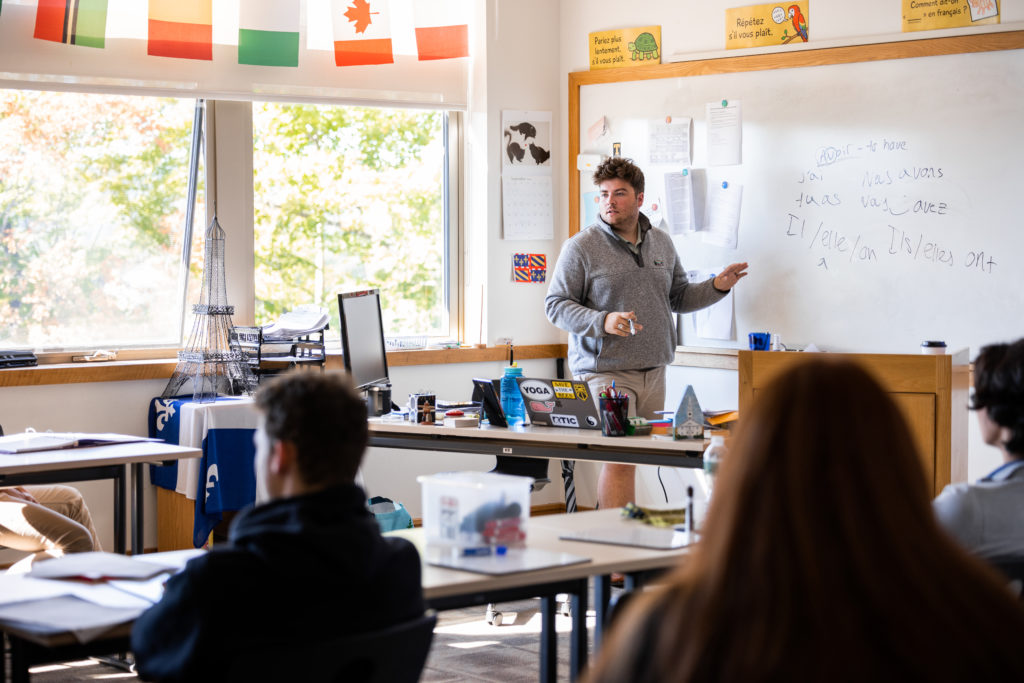
Scala-Harbert Brings Tilton's Approach to Statewide Conference
The plan was never to become a French teacher, says Tilton faculty member Joe Scala-Harbert. Though he took to the language starting in middle school, it wasn’t until some convincing from one of his college professors that he committed to officially declaring as a French major.
“I decided it would be unique to pursue it in college and challenge myself to push through the boundary,” says Scala-Harbert. At the end of the day, it was a love of learning that helped drive the decision about his education and, ultimately, his career. Now in his fourth year as a faculty member at Tilton, he’s trying to foster that same sense of lifelong learning in his students.
During the school’s March break, Scala-Harbert — with help from Dean of Teaching and Learning Katherine McCandless and alongside Humanities Division Head Elizabeth Renaud — presented to the New Hampshire Association of World Language Teachers at its annual conference. It was a full-circle moment for Scala-Harbert, who attended the event as both a high school and college student, to be in attendance as both a presenter and a member of the organization’s Board of Directors. Speaking to a room of French teachers from both public and private schools around the state, he used Tilton’s Advanced French Language and Culture course to highlight how educators can keep students engaged.
“At the end of the day, there are certain things in a language class that you have to do,” reflects Scala-Harbert. “It’s the gray space where you can say, ‘How can I really pull potential from this advanced student and apply it in a way that’s beneficial to their experience?’”
Though Tilton does offer Advanced Placement French, students who complete the school’s offerings through French 4 often felt, as Scala-Harbert says, that they were interested in a different outlet for continued study. Together with Mike Landroche, then the Academic Dean, he began to brainstorm about what an alternative to AP French might look like; something that could teach both the language and the culture while also encouraging further study.
“Four years ago there was a student who had graduated through French 4. She had ties in France and loved speaking the language,” he says. “I told her, ‘I don’t want to turn you away.’ Because we should never turn away a student with languages being one of the most underrepresented courses and disciplines in the U.S. It’s crucial that any student who wants to continue gets to do that.”
Though the idea was, originally, to construct a research-based experience, this particular student had an interest in tutoring. Scala-Harbert began having her work with his six French 1 students on exam prep. The next year, Advanced French Language and Culture had four students, and then six the following year. Now, the year-long course takes a different shape during each trimester, beginning with a role similar to a teaching assistant in the fall, shifting to a focus on essays, film reviews, and personal reflections in the winter, and wrapping up in the spring with a combination of everything. Over the duration of the class, Scala-Harbert’s students are creating artifacts like study guides and vocabulary worksheets — aimed at reinforcing the basic structure of French at the first and second levels — as well as delving into complex theory that advances their understanding beyond mastery of the language.
“I asked one group to write about the Liberation of the Congo in 1960,” he says. “Sometimes there are oddball projects that pop up. For example, the school had purchased an article in French from 1889 — nine pages of 1890s French! It was very challenging for the students because it used a lot of slang. So, for six to eight classes, they were translating and asking me questions, but now when they talk about their favorite assignment it’s this article translation.”
All of this work, says Scala-Harbert, goes into portfolios that help display not just the content the students learn, but also the progress they make in relating their understanding to the students they work with.
“This course lines up perfectly with our Habits of Mind,” he continues. “It has academic components, of course, but what the student puts into the class with regard to interest and drive and ongoing passion is how it all gets applied. It’s very personalized — I look at their strengths at the beginning of the year and go from there. Ultimately, they need to be engaged with the student they’re working with, they need to be engaged with each other, and they need to be engaged with me.”
During his presentation, Scala-Harbert was able to share testimonials from his students to help illustrate the impact of the class.
“My expectations for the course were pretty much just to correct French homework from lower grades and exams but I can tell you that it was much better than that,” says Jeremy D’Souza ’25. A native of Montreal, QC, Canada, D’Souza arrived at Tilton as a fluent French speaker. “Overall, it’s a unique experience and we are extremely lucky to have had the chance to take it.”